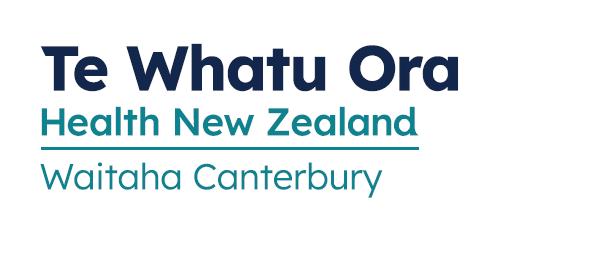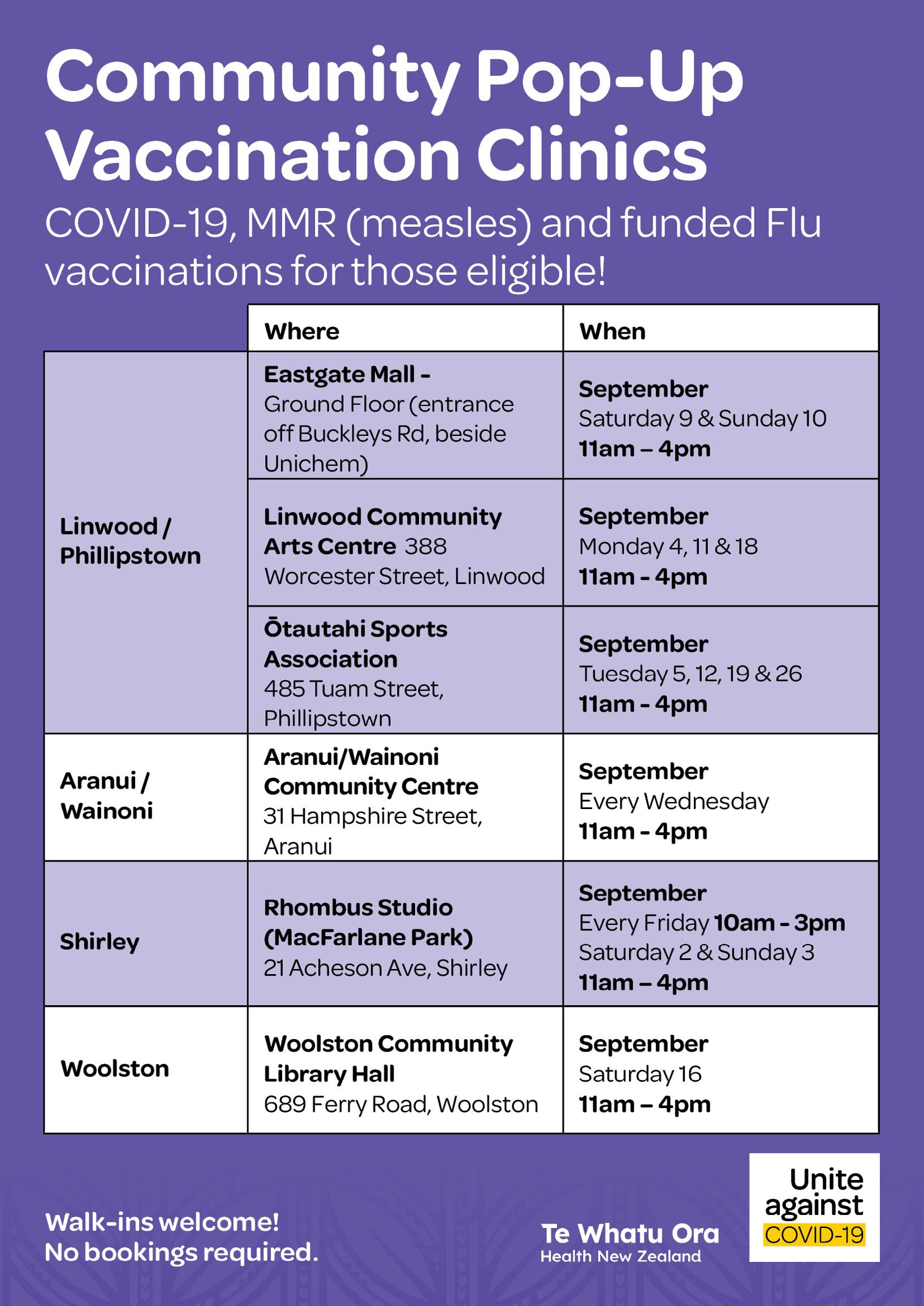








Kupu Arataki – Introduction... pg 3-5
QUIZ - Rugby World Cup 2023 ... pg 6
Ā mātou tāngata – Our people

› Staff and consumers move into new Hillmorton facilities... pg 7-8
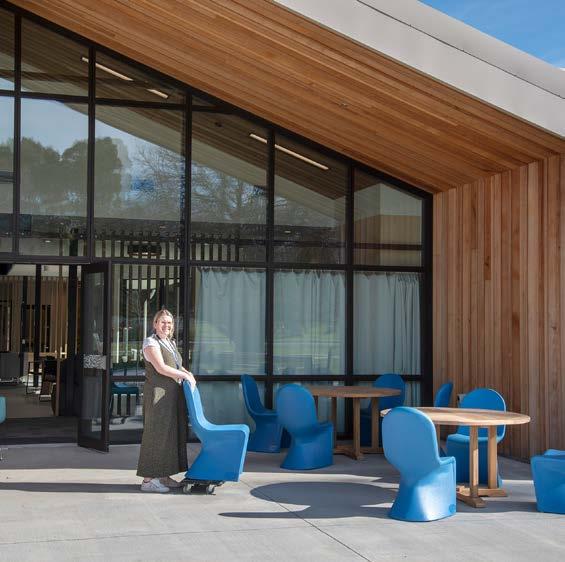
› Greening up their commute... pg 9–10
› One minute with… Lily Simons, Recruitment Team Leader, Medical and Corporate... pg 10-11
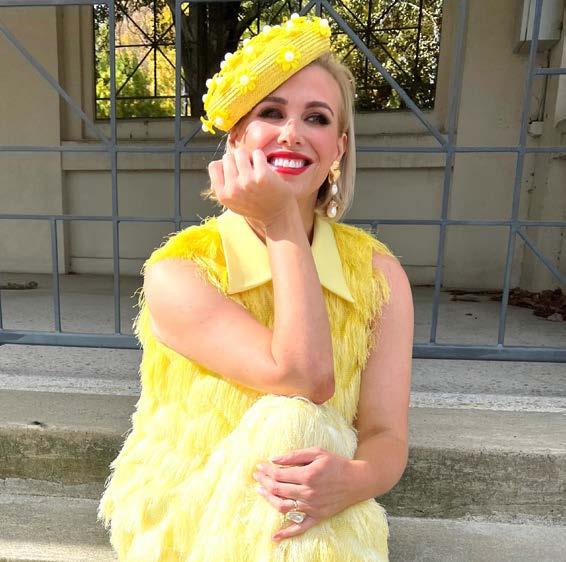
› Akoranga reo Māori – lesson #30 Hapūtanga - Pregnancy... pg 12
› What is Spring?... pg 13
Whakamihi – Bouquets... pg 14–15
Ā mātou korero – Our stories
› Cervical Screening Awareness Month... pg 16
› More than half a million dollars granted to Christchurch health researchers... pg 17-18
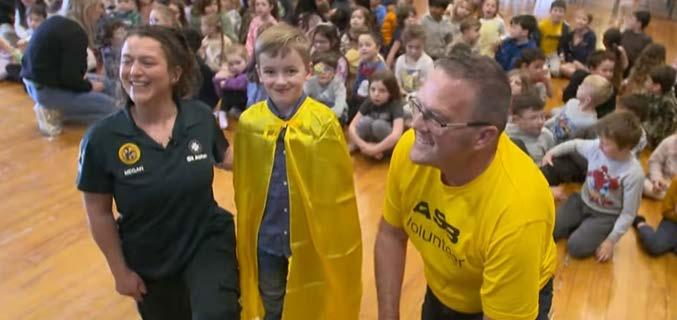
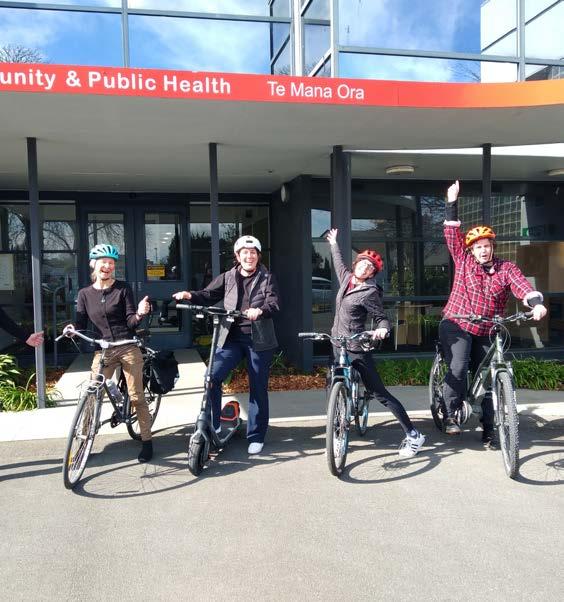
› Eight babies a day in New Zealand born with Fetal Alcohol Spectrum Disorder... pg 19
› Step Ahead Trust Art Exhibition... pg 20
› World Sexual Health Day... pg 21

› New initiative for younger-onset dementia successful In Canterbury... pg 22
Pānui – Notices... pg 23-25
A commitment to roll out a new approach to manage the response to 111 calls for people experiencing mental distress was announced last week.
Some areas in New Zealand are already piloting joint Police-Health responses. Over the next five years, this will be expanded to allow co-response teams consisting of Police, mental health professionals and in some areas, ambulance officers and/or a Māori health navigator, to attend to people in a mental health crisis. This will be a transition from what has been, to date, a Police-led response.
People experiencing mental distress account for around 10 percent of current 111 calls and a wholly Policeled response is not always appropriate. This new initiative will allow specialist mental health support to reach these people quickly and free up Police to manage other emergency calls. Further information is available here
The Christchurch Hospital Neonatal Intensive Care (NICU) has many premature and unwell babies who need breast milk donations, but unfortunately, supplies in the NICU Milk Bank are running very low.
Breast milk is vitally important for these wee babies and when a parent's own milk is not available, the Christchurch Hospital Milk Bank offers support by providing screened and pasteurised donor milk.

Breastfeeding mamas with a surplus of milk are desperately needed to donate. If you or someone you know could help, please reach out to our team:
› Phone: (03) 364 4344
› Email: MilkBankNICU@cdhb.health.nz
Your donation could help save a life.
Around 160 women will be diagnosed with cervical cancer in 2023, and 50 will die from it. Cervical Screening Awareness Month serves to promote awareness and encourage women who may have put off screening, to get themselves checked.
You can read more about this on page 16.
In next week’s edition (11 September) detail will be provided on the change coming to the primary test for cervical screening. Effective 12 September, this will be a human papillomavirus (HPV) test, with the option of self-testing.

With around six weeks until we cast our votes, it’s timely to make sure we’re all familiar with the things that are and are not, acceptable as public servants during the pre-election period.
What is generally okay?
› Supporting or being a member of a political party
› Having private conversations about politics and policies with interested colleagues
› Attending party meetings and sharing political content outside of work
› Standing as a candidate for parliament, keep in mind you must disclose this (contact the email linked below)
What is not okay?
› Campaigning for a party or a candidate in the workplace
› Providing political parties with your work contact details
› Engaging with political parties while at work
› Using publicly funded resources for political purposes
When in doubt, check things out – read the handy two-page Public Service Commission General Election Guidance Summary, talk with your leader, or get in touch with our Te Whatu Ora Integrity Champion.
You can vote in the New Zealand General Election if:
› You are aged 18 years or older
› You are a New Zealand citizen or permanent resident and

› You have lived in New Zealand for 12 months or more continuously at some time in your life.
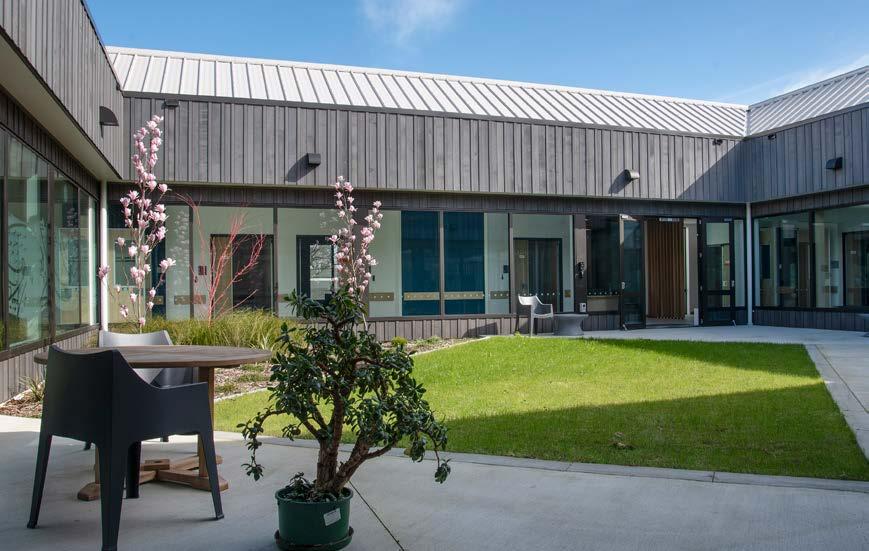
To enrol to vote, check your enrolment or update your information, go to the Electoral Commission website here
Last week, the staff from Specialist Mental Health Services in The Princess Margaret Hospital (TPMH) began the big move into the new buildings on the Hillmorton campus. The teams spent Friday moving documents, furniture, and equipment. The first consumers move in today with the rest transferring from TPMH tomorrow.
You can read more and see additional images on page 7-8.
In May, at his school in Feilding, Max and his classmates were taught what to do in a medical emergency during a lesson from a Hato Hone St John school educator. Fast forward a couple of months, and Max put what he had learned into practise when his father collapsed in agony at home. Speaking to the 111 operator, he was able to provide his home address and describe in detail what was happening with his father.
Max’s dad was flown to Christchurch for emergency surgery where he remains, away from his family. You can learn more about what Max did, his subsequent bravery award and see his reunion with his father in this delightful Seven Sharp story
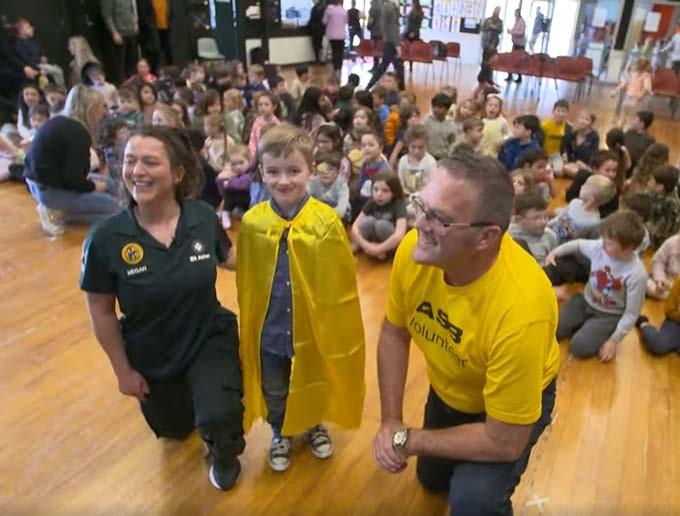
If you would like to know about the Hato Hone St John community education programmes which include school visits, information is available on the St John website
This week we celebrate Uike Lea Faka-Tonga 2023 (Tonga Language Week) and the theme this year is 'E tu'uloa 'a e Lea faka-Tongá 'o ka lea'aki 'i 'api, siasí (lotú), mo e nofo-'a-kāingá, which means the Tongan language will be sustainable if used at home, church and in the wider community.
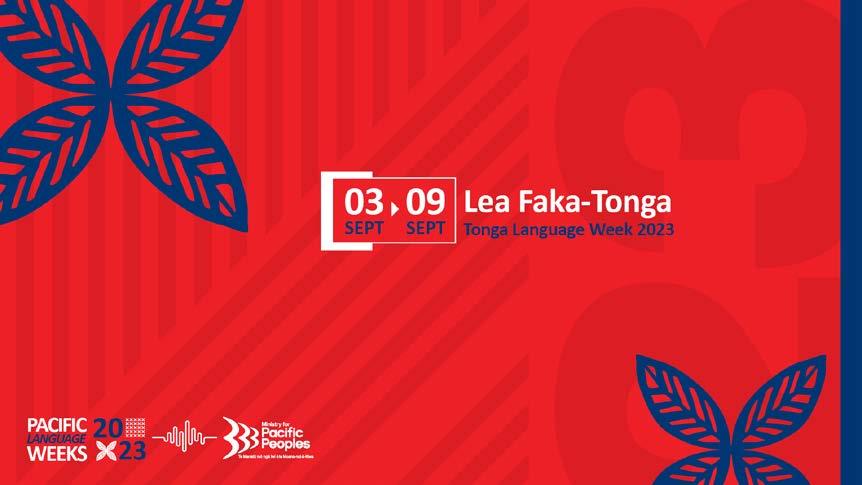
According to the 2018 census, more than 80,000 people who identify as Tongan or part-Tongan, live in New Zealand. You can learn more, access resources and find events to mark Tonga Language Week on the Ministry for Pacific Peoples website.

Last Friday 1 September was the first official day of spring. Kate, a photographer from our Medical Illustration team captured this image from the woodland area of Hagley Park, behind Waipapa, beside the Avon River. This area provides a beautiful outlook for the staff and patients in Riverside and Waipapa, and for those who can, a calm space to take a walk or just sit and enjoy the view.
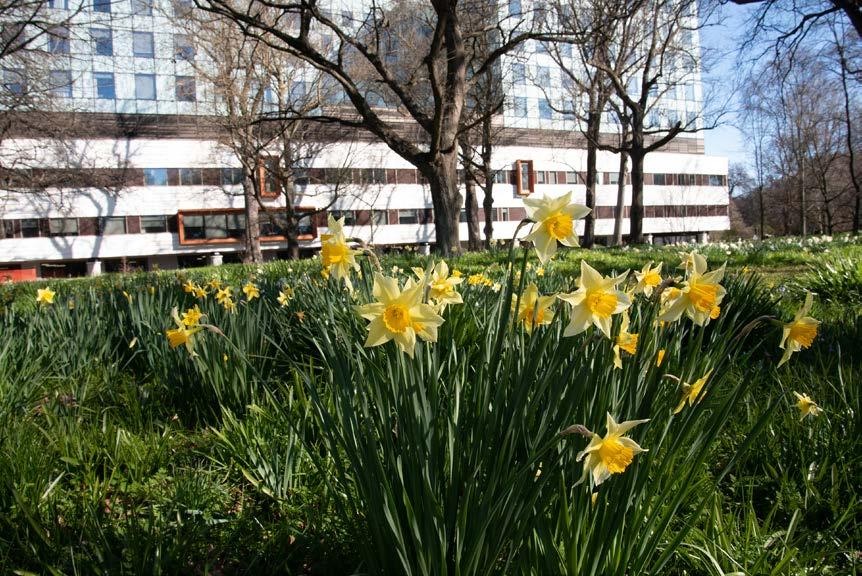
With the opening ceremony and the first game just days away, what do you know about this year’s Rugby World Cup.
1. Leading up to this World Cup, England was left stunned when they were beaten in a warmup match by this second-tier team for the first time ever. Who humbled the English at Twickenham?
a. Samoa
b. Fiji
c. Namibia
d. Uruguay
2. What New Zealand rugby great caused shock and consternation here at home when it was announced that they would be taking on an advisory role with the Wallabies during this Rugby World Cup?
a. Richie McCaw
b. Wayne Smith
c. Grant Fox
d. Steve Hansen

3. New Zealand is in pool A this world cup alongside France, Namibia, Uruguay and which other country?
a. Italy
b. Tonga
c. Ireland
d. Samoa

4. Who is the most-capped All Black playing at this year’s Rugby World Cup?
a. Aaron Smith
b. Beauden Barrett
c. Sam Whitelock
d. Brodie Retallick
5. Chile is sending a team to the Rugby World Cup for the very first time in 2023. Who did they beat to qualify for the tournament?
a. Canada
b. USA
c. Argentina
d. Scotland
6. As host, France will play the first match immediately after the Rugby World Cup opening ceremony. What team will they play?
a. Uruguay
b. Namibia
c. England
d. All Blacks
7. Assuming the All Blacks win pool A, who will they play in the quarterfinals?
a. Runner-up pool B
b. Winner pool B
c. Runner-up pool C
d. Winner pool C
8. Who is captain of the All Blacks 2023 Rugby World Cup squad?
a. Dane Coles
b. Ardie Savea
c. Sam Whitelock
d. Sam Cane
9. True or false. France is hosting the Rugby World Cup for the first time.
a. True
b. False
10. How many Crusaders are in the 33 man All Blacks Rugby World Cup squad?
a. Eight
b. Nine
c. 10
d. 11
Check your answers on page 23.

There were some excited Specialist Mental Health Services (SMHS) staff in the new buildings on the Hillmorton campus last Friday. They were unpacking and setting up in anticipation of the first consumers moving from The Princess Margaret Hospital into the facilities today. Their bright smiles matched the perfect weather and the colours, light and warmth of the new buildings.
Housekeeper Janice Kerr says this day has been a long time coming.
“We’ve watched all this develop and it’s so great to be finally moving in.”
Consumers and their whānau were able to visit the new purpose-built mental health facilities prior to the move and the feedback from them was overwhelmingly positive. Both buildings will be occupied with the move completed tomorrow.
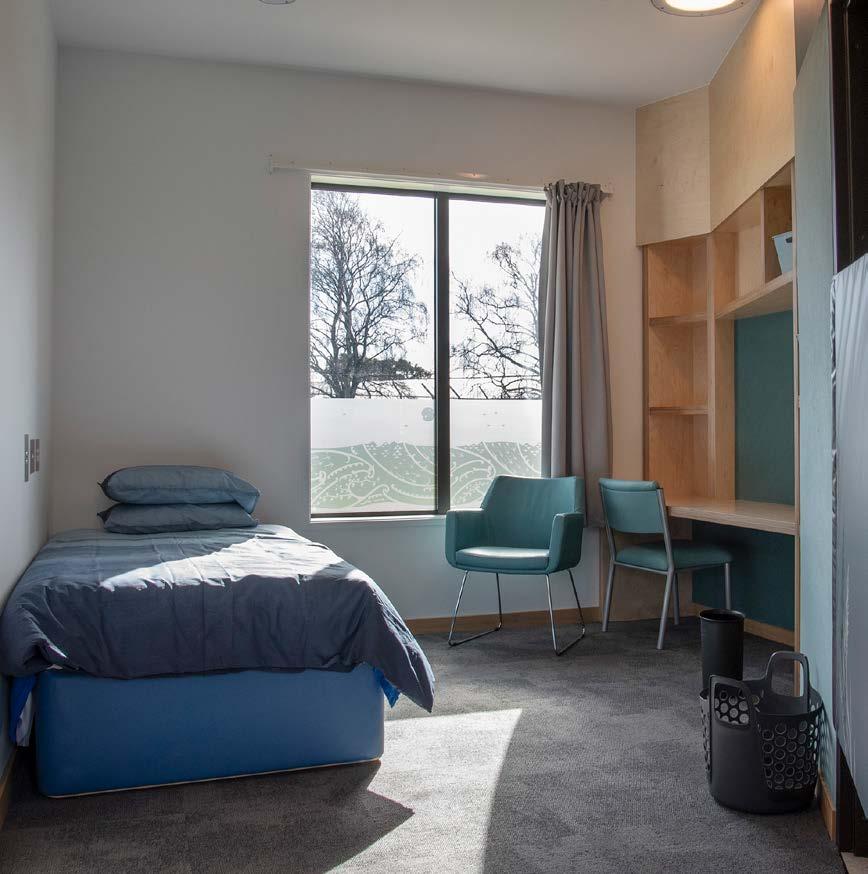
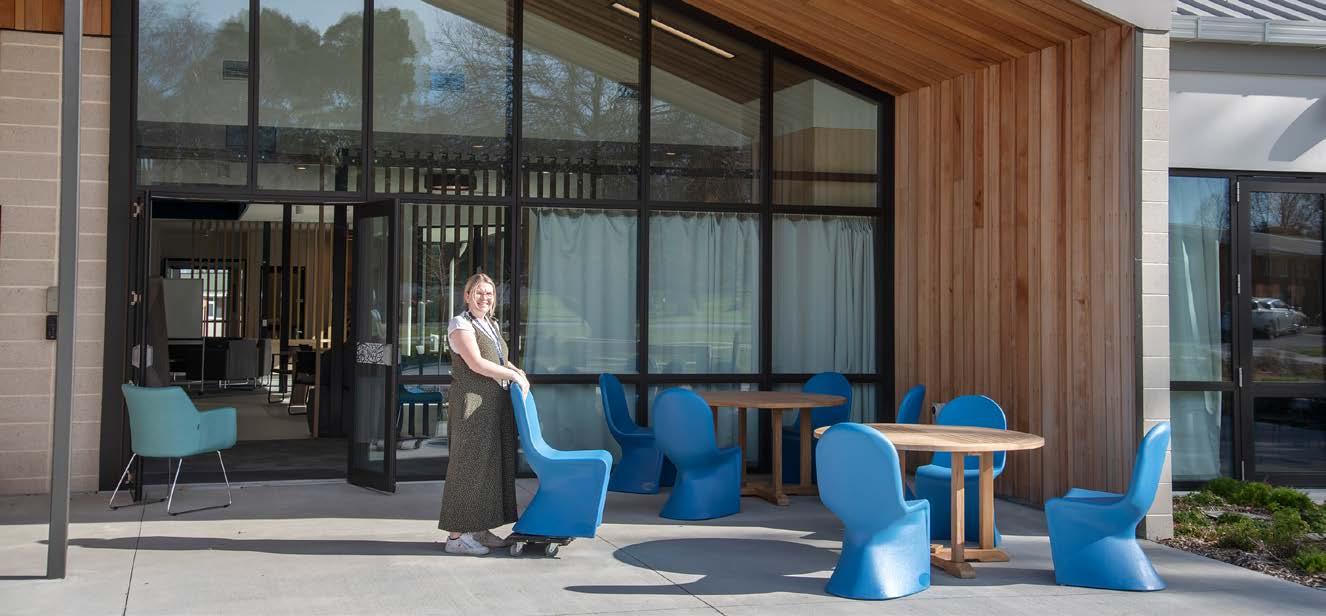
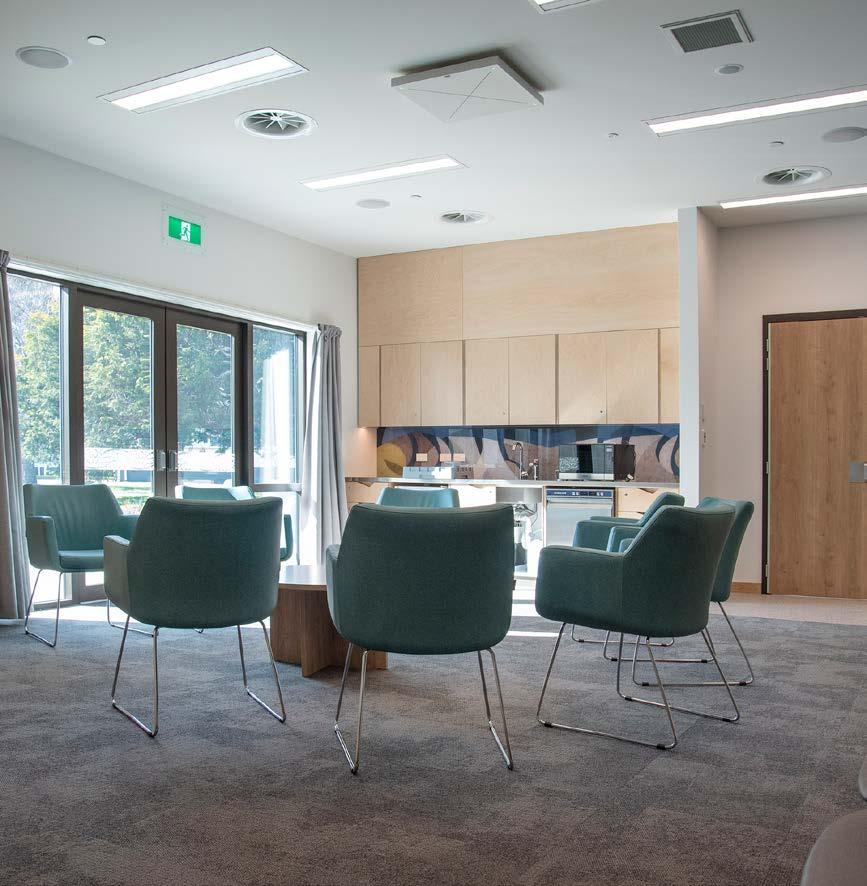


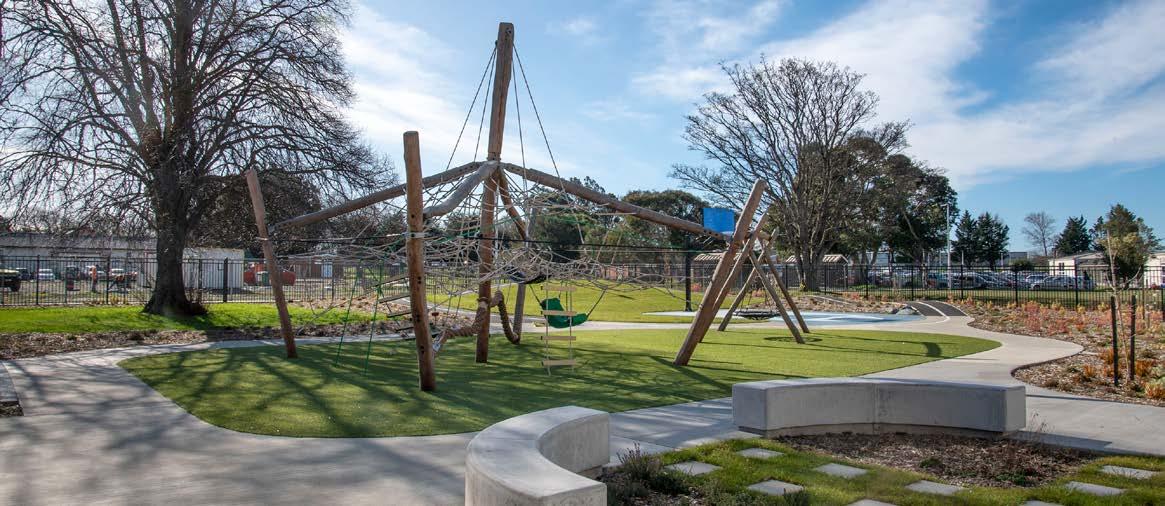
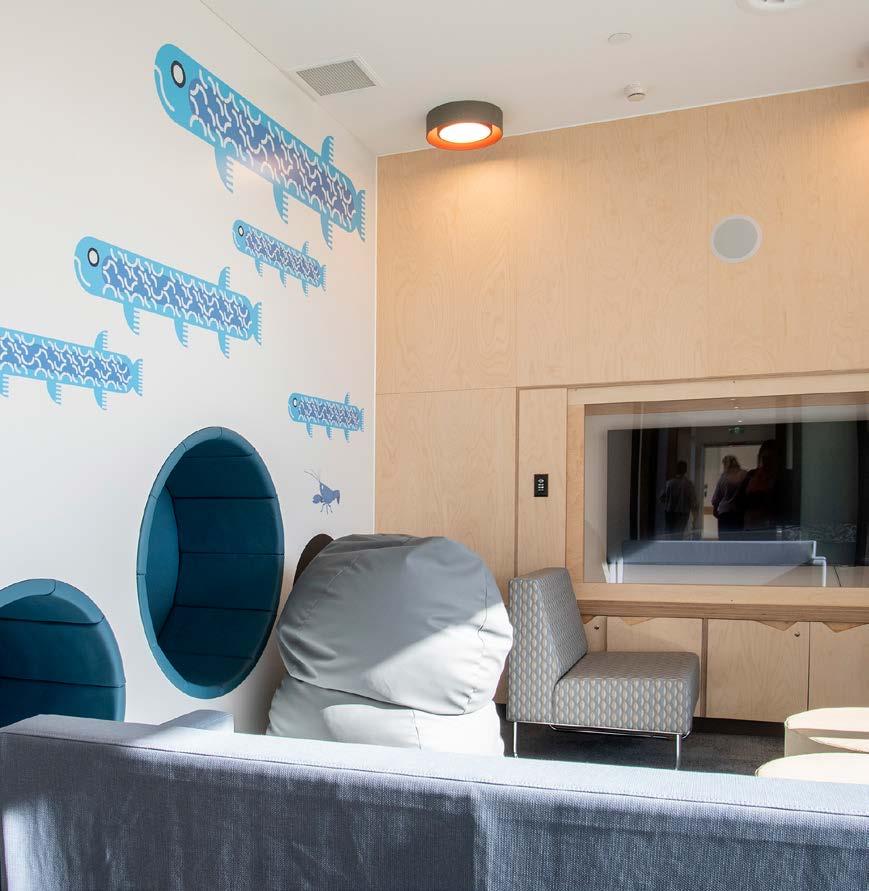
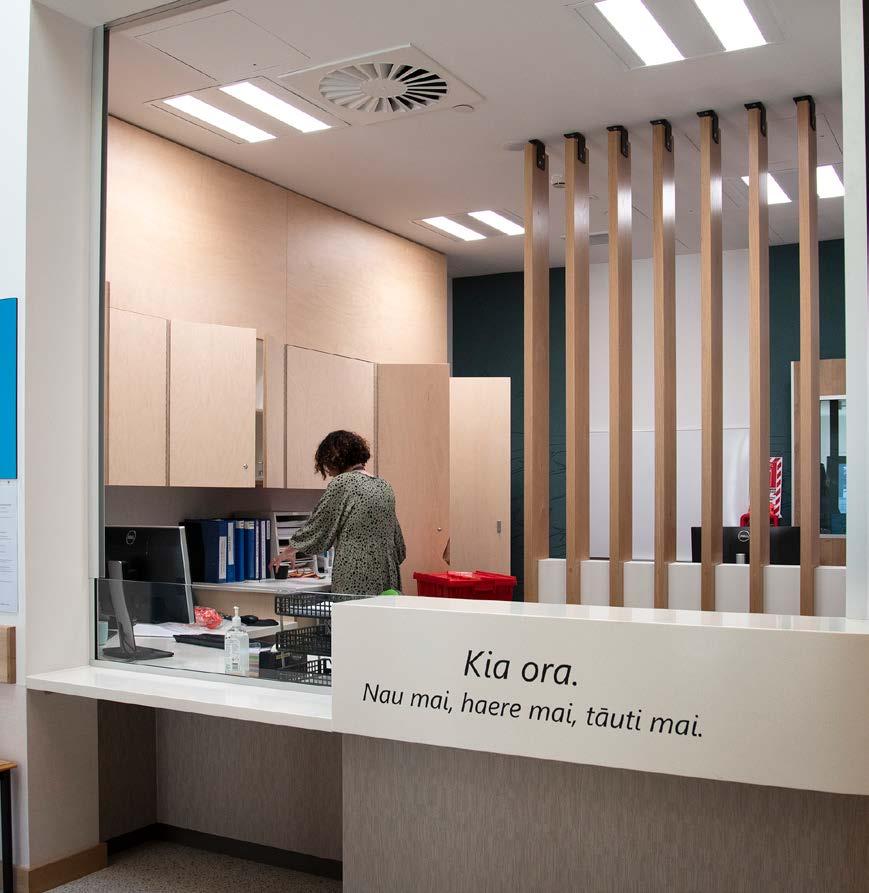
It’s all go at Te Mana Ora (Te Whatu Ora Waitaha Canterbury’s public health unit) as their kaimahi build up to a big group effort for International CarFree Day.
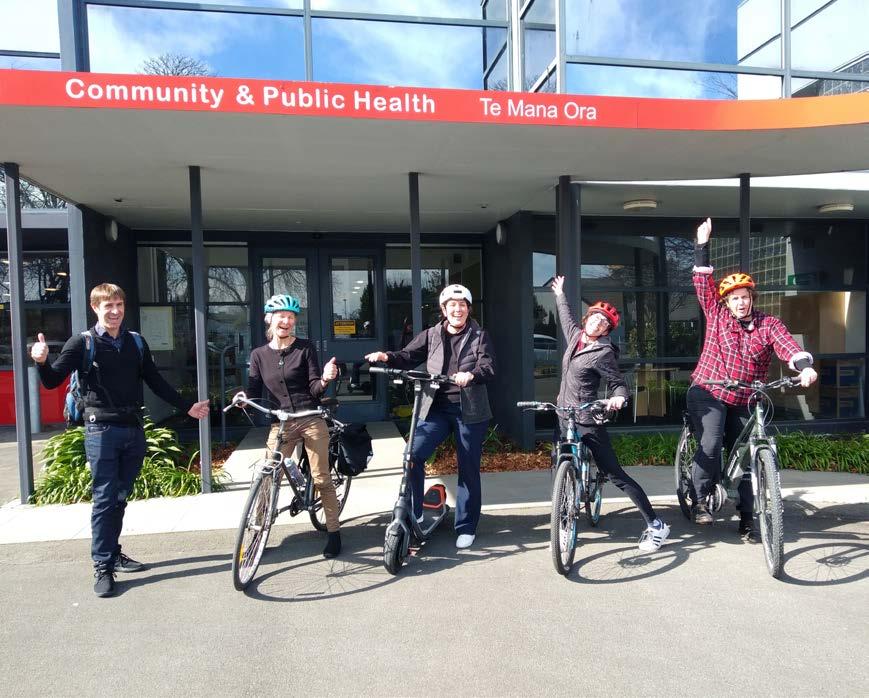
The event, promoted by Te Mana Ora’s Sustainability Group, takes place on Friday 22 September.

“However, as we have several people who live rurally and don’t work on Fridays, we’re celebrating it on Thursday 21 September and calling it ‘Carlite Day’,” says Health Promoter and Sustainability Group member Meg Christie.
The aim is for those who usually drive to work on their own to consider other modes of transport for their commute in order to travel more sustainably. This includes ride sharing (especially for those who live outside of Christchurch city), e-scootering or e-cycling or using public transport.
Te Manu Ora kaimahi have been having fun in the weeks leading up to Car-Lite Day with activities and competitions to help them identify their best public transport options. Everyone who enters has the opportunity to win prizes.
“Car-lite Day just happens to be in the middle of Mental Health Awareness Week which has the theme of the 5 Ways to Wellbeing. A sustainable commute does (or could, if you haven’t tried it yet) address each of these wellbeings,” Meg says.
TAKE NOTICE: When I parked further away from the office and walked, I saw a family of ducklings.
BE ACTIVE: I logged 1,200 steps when I walked to the bus stop.
CONNECT: I asked a work colleague, who I have never talked to before, how they were traveling for Car-Lite Day. It started a great conversation.
KEEP LEARNING: If I bike to the bus stop, I’ll have to learn how to put my bike on the bus.
GIVE: If I go by bike/feet/bus on 21 September my parking space may go to someone who may really appreciate it!
Globally, Car Free Day is celebrated with events that highlight the numerous benefits of going car-free including reduced noise and air pollution and the health and wellbeing benefits of walking, cycling or other physically active travel modes.

Some local authorities have even hosted street picnics to showcase the joy of car-free towns and cities.
“In Ōtautahi Christchurch we are fortunate to have a growing number of bike lanes and walkable streets, but urban sprawl, and other limitations mean that people have differing commute options”, says Meg.
People have different needs and attitudes when it comes to car travel alternatives. Where the ability to use car-free transport is low, promoting going ‘car lite’ can be more encouraging and inclusive.
“It still encourages those who can, to go car free, while supporting people who drive to consider carpooling, driving a smaller portion of the commute and walking (or other mode) further to the workplace, or making a different contribution to caring for our planet.”
Christchurch City Council
Gen Less (Aotearoa)

Metro (Christchurch and Timaru)
Waka Kotahi (Aotearoa)
Free city travel planning support for Christchurch workplaces.
A quiz, posters, stories from businesses, email, intranet and social assets, ideas for businesses to support staff to commute sustainably. See Gen Less here
Benefits of public transport, and how to get started for first time users. Links to public transport maps, timetables, fares information, and Metrocard for Christchurch and Timaru.
Information on walking, cycling and public transport including a workplace cycle guide
United Nations Environment Programme (Global) Reducing air pollution article including global stories and links.
What does your job involve?
I am the Team Leader of Medical and Corporate Recruitment. This involves looking after six specialists who recruit into our Medical and Corporate teams in Waitaha. My role also involves some recruitment for the corporate building. What pathway got you to this job?
I worked in agency recruitment after university and in internal HR (human resources) roles as well as recruitment roles. My husband and I had twins five years ago at Christchurch Women’s Hospital and I have always been in awe of the medical field, so naturally when this role came about, I tried my luck – and here I am!
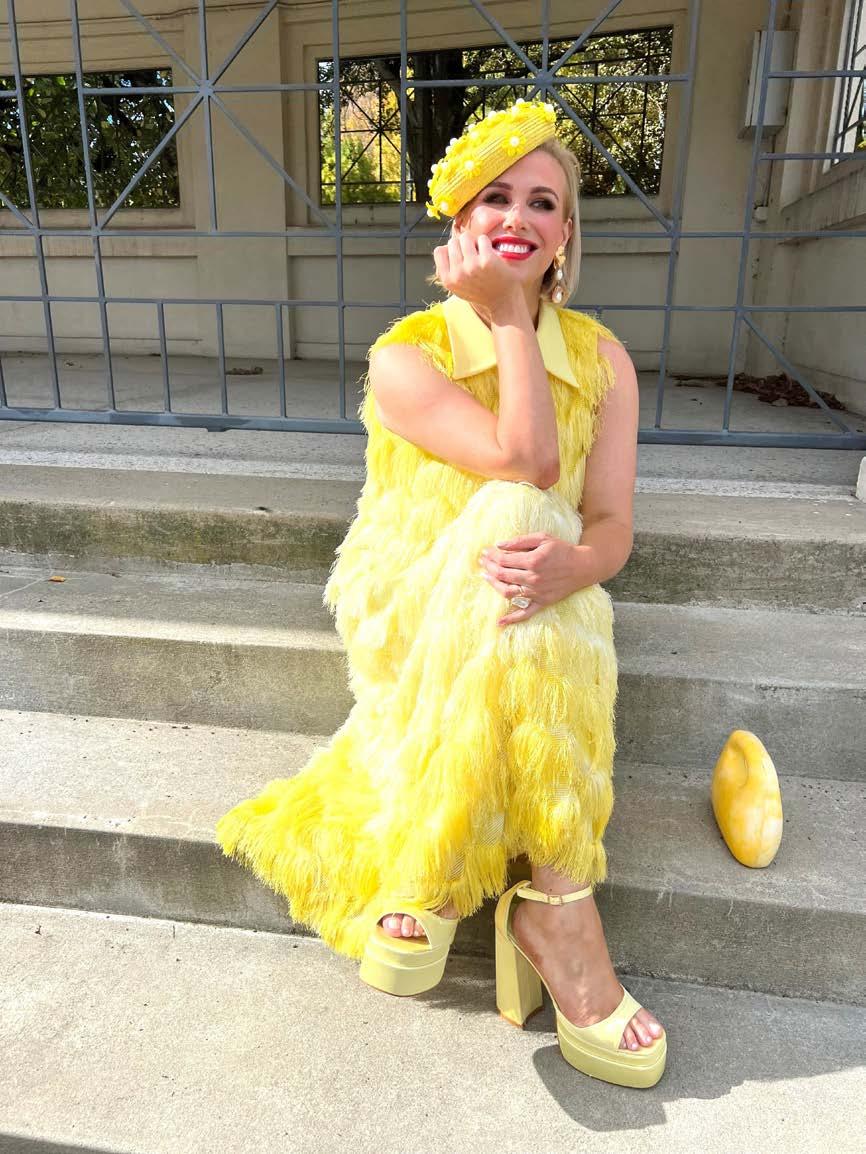
What advice would you give someone keen to enter your field?
Network and connect. Recruitment is all about people (and my absolute favourite part of the role). You don't need a university degree, but a lot of recruiters have an HR qualification. A clinical background is also appreciated. We recruit health care professionals, so any knowledge of this area is useful.
Who inspires you and why?
My family and friends inspire me hugely. I have a wonderful support system around me. In terms of the business, our clinical teams inspire me to do better, they work so hard, and I just hope I can make a small difference by finding them incredible staff. My manager Kelly Randall inspires me daily. She runs marathons, runs a household, and runs the world! She is one of the most positive and innovative leaders I have ever worked with! I also look up to women here at Waitaha leading the way in health, such as the incredible Jo Domigan, Lisa Blackler and Pauline Clark, who lead with such mana. My own team inspire me too, I work with some fantastic recruiters. There is always someone to seek advice from and lend a hand and that’s what inspires me daily to do my job.
What do Waitaha Canterbury’s values (Care and respect for others, Integrity in all we do and Responsibility for outcomes) mean to you in your role?
I think we all share a similar goal here of support, care, and respect. I feel so much care and support around me, from my incredible team to my wonderful hiring managers.
If you could be anywhere in the world right now, where would you be?
Travelling the world with my family chasing the sunshine and eating wonderful food somewhere in Europe in a tiny home on wheels.
Who would you want to play you if there was a movie made about your life?
Leslie Mann. She was in the film, ‘This is 40’. I can see myself relating to this more and more as I near my mid to late 30s.
What are some of the ways you and your whānau show their aroha/love for our planet?

We love going to the beach and talking about how lucky we are here to live on this beautiful planet. My husband and I often speak to our children around how we can care for papatūānuku (the land). My parents have a huge allotment where they grow fresh vegetables and fruit for us all. Our twin boys are often there gardening and giving back to the earth. They also collect honey from my colleague Kelly Randall who delivers this to work, so we talk a lot about how the bees make honey and how we can plant more flowers for bees.
What are your hobbies/interests outside of work?
I compete in ‘Fashions on the Field’ at horse racing events. Think big hats and crazy fashion. Long story short, it’s a huge passion of mine and this year I won the Prix De Fashion at Ellerslie. This means that I now wear the New Zealand crown, so to speak, and I will represent New Zealand at the Melbourne Cup fashion event where over 400 competitors enter three days of fashion competitions. A Kiwi has only ever won once, so it would be nice to try and make the top 20 at least on one of the days. It’s a hobby that keeps me being creative and is something for just me.
If you would like to take part in this column or would like to nominate someone please contact Naomi.Gilling@cdhb.health.nz
E rere atu nei aku mihi whakamānawa ki a koutou katoa kua hoki mai anō ki tā tātou kaupapa, arā ki tō tātou akoranga o te wiki.
My acknowledgements go out to honour you all who have returned to our programme, that is, to our lesson of the week.
This week we are going to delve into the ao hapūtanga, the world of pregnancy and learn some ways that can introduce te reo Māori into our mahi (work) when caring for someone who is hapū (pregnant) and their whānau (family).
Some of these words you may recall from previous akoranga however they are also relevant here when talking about hapūtanga from whānau perspective.
Mātua Parents
Whaea Mother
Matua Father
Kuia Grandmother/older woman
Koroua Grandfather/older man
Tuakana Older sibling of the same sex
Teina Younger sibling of the same sex
Tungāne Brother of a female
Tuahine Sister of a male
Tamaiti Child
Mokopuna Grandchild
Mātāmua First born, eldest
Pōtiki Youngest
Hopefully you will have noticed that several of these important kupu have more than one definition. It is no coincidence that the words hapū, whānau and whenua have dual meanings in te ao Māori or the Māori world. It illustrates the significance of pregnancy and childbirth to whānau Māori (Māori families) as well as the deep Māori connections to land. For example, many Māori will choose to keep the whenua (placenta) from the pēpi so that they may bury it on their ancestral whenua (land), herein linking the new pēpi to that whenua (land) forevermore, along with all of those who have come before.
Pēpi Baby
Oriori Lullaby (about ancestry, tribal history, aspirations)
Hapū Pregnant and sub-tribe
Whenua Placenta and land
Whānau Family and to give birth
Wahakura Bassinet (woven)
Pito Navel
Whare tangata Womb/uterus
Whānau whakawae Breech
Kumama Crave certain foods
Wainamu Dislike certain foods
He
Incorporate some of these kupu into your everyday language when dealing with whānau Māori and the next time you have the opportunity to greet a new pēpi, try using the following phrase Nau mai e te pēpi ki te ao mārama Welcome to the world of light little one.

E mihi ana ki a koutou, ngā pou whirinaki e tairanga tonu ana i tēnei taonga tuku iho mō tātou katoa.
Greetings to all of you loyal and dependable people, continuing to elevate this treasure that has been passed down for all of us.
If you have any questions or feedback, please make contact via the email below. Hauora.Maori@cdhb.health.nz
(Above) As a photographer I love spring for the photo opportunities with many spring flowers, lambs and other babies born. Also, it's the beginning of the whitebait season. The weather starts to get warmer, and the days are longer.
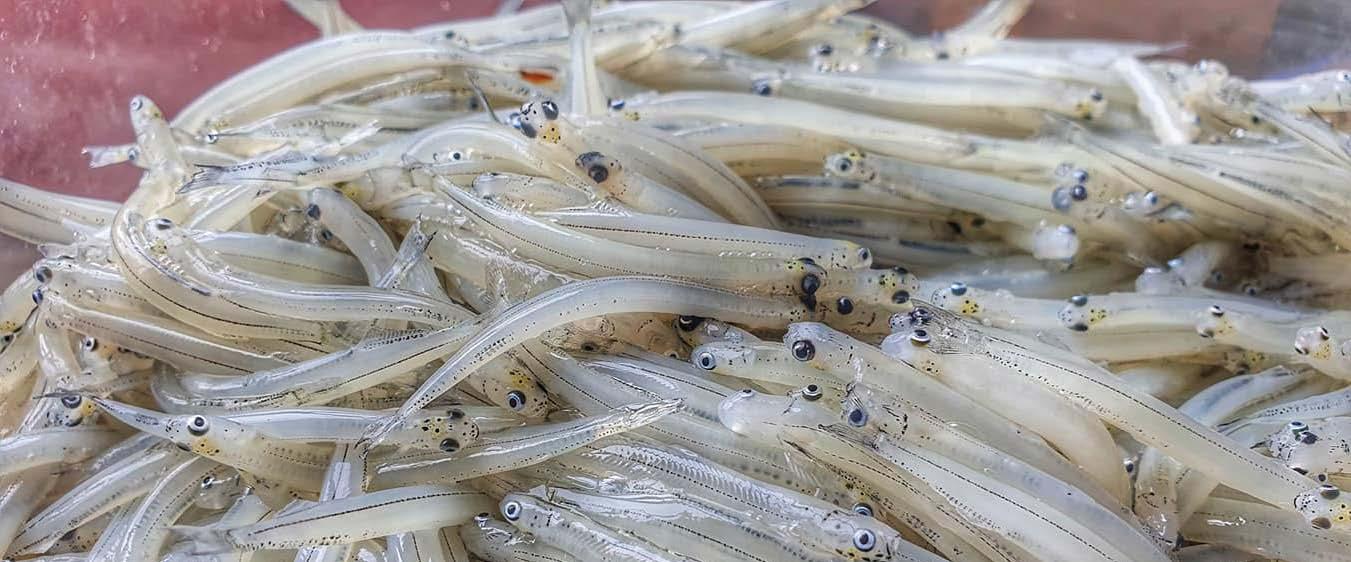
Booking Coordinator - General Surgery Alison Parish

(Left) Spring is the meaning of hope. Hope. Optimism. Perfection. Enjoyment. Spring is a new awakening, new life. Cute little bouncing lambs, fresh green leaves on the willow and oak trees and brightly coloured flowers. The warmth of the sun after the cold of winter, the end of the cold nights sitting around a fire. Sunny, blue skies. The buzz of a bumblebee. Sweet-scented florals in the air. Fresh mown grass. Sun. Perfection. Rejuvenation. Inspiration. Newness. Growth. All equal spring.
Telephonist/Receptionist
Pauline HartWhat is spring to you? Share your favourite thing about the season, what you’re looking forward to or what defines spring in Canterbury for you. Just a few words and a photo (if you have one) will help us all get excited about the upcoming change in season. you can contribute by clicking here or on this URL: https://forms.office.com/r/7aGbwjdy36
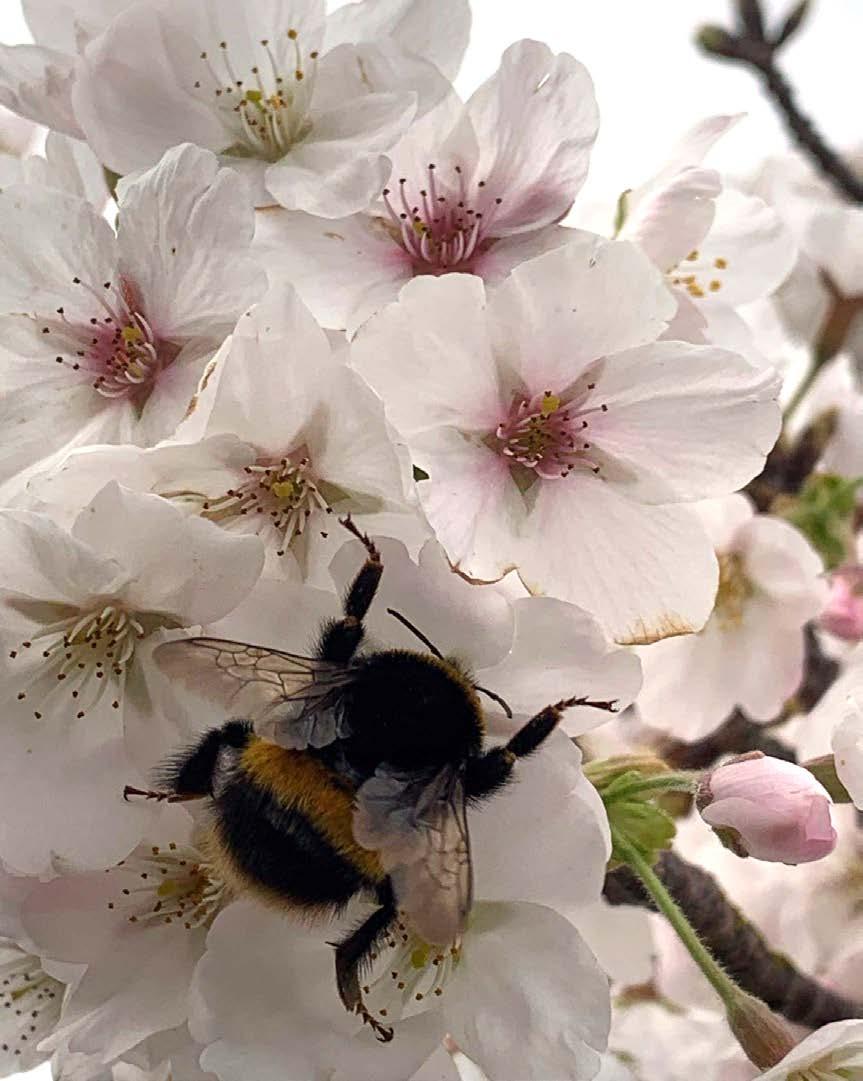

Our family would like to extend a huge thank you and appreciation to all the staff who helped with the care and passing of our family member. She spent most her time on Ward 14. The nurses, administration staff and specialists were always of outstanding help. They made the experience very positive and comfortable for us all, keeping us well informed, and helping us and [patient name] make the best decisions. Even going to the extent of helping us get a bigger room for all our family for the last day. Special mention and thanks to the afternoon administrator and Nurse Carlo. You have a wonderful team in there and I hope you please pass on our appreciation.
Thanks to the ED staff, Nurse Mary, and the admitting doctor. Their professional care and smiles, although they were busy, were really appreciated. You helped with a difficult experience.
Dr Roxanna Sadri is the loveliest, most validating, and empathetic medical professional I have ever come across. She showed me true genuine care and understanding and is the first professional to truly listen and help. I can’t speak her praises enough.
I want to say a huge thank you to every staff member in the maternity units, Maternity Assessment Unit, and those on levels 3 and 5 of Christchurch Women’s. I had a long induction and stay on Level 5 resulting in eight days total in hospital. Everyone who cared for me, from the midwives to the catering assistants, were so kind and caring. I had not planned to go to hospital for the birth and didn't want to be there but was blown away by the magical humans in Christchurch Women’s. I felt so supported and left hospital confident and healthy ready to care for my baby. Thank you so much to everyone involved and for giving my baby a great start in life. You are all angels!
Thanks to all the staff for their dedication and mahi.
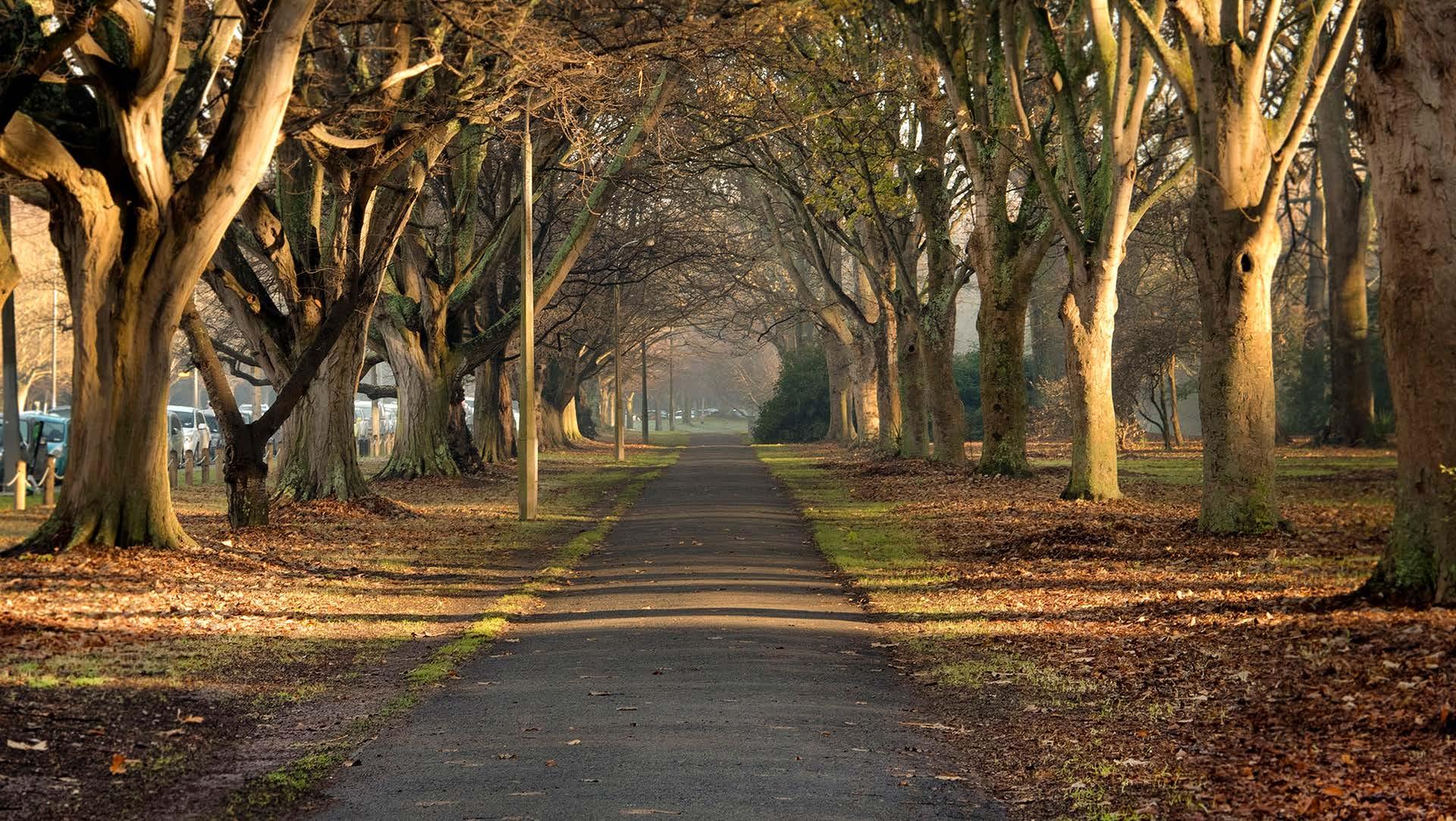
Staff have been excellent, very professional. Thank you for all your help getting me through this difficult time.
Registered Nurse Judy was extremely caring and efficient. I would like to say what an asset she is to the team on Ward B3.
Very good food service!
Over many months we experienced the care, warmth, and expertise of Fiona and Polina. Their friendly welcome and expert care of my wound was exemplary, and I have made good progress.
All the staff involved were absolutely terrific, but one staff member was so good that I feel I should make special mention of her. She performed an ultrasound on my affected leg, and she was efficient and professional. What really struck me was her friendly, warm, and calming nature as she engaged in conversation with me. The experience was one that I thoroughly enjoyed and feel that this health professional adds great value to Waitaha and the health system. I am hoping that she can be ‘tracked’ and my compliment passed on.
ED,


I want to thank all the people involved in my husband’s care when he suffered a stroke – Hato Hone St John’s Neil and Rosy, Nurse Lulu, Dr Katy, Stroke Nurse Emma, and Dr Ashley. All of you were magnificent professionals who communicated so clearly with us. We are very grateful for your help that day.
I want to compliment Catering Assistant Evengeline on her next-level service. She was never without a smile and genuinely cared for the patients in what looked like a very hard job. It was amazing to always see such a friendly face and I wouldn't be surprised if her positivity has cured some of your patients more than the medicine! I was a sick child, so have been in and out of hospital my whole life and have never felt a need to compliment someone like this, but I am just so impressed.
Can you please pass on my appreciation to Andrew ‘Maps’, the anaesthetist. He did my emergency c-section in July and was so wonderful at keeping me calm and informed throughout. The whole experience came about so quickly but he went above and beyond to make my husband and me feel involved and comfortable, and I can't thank him enough. He is a huge asset to the hospital.
In 1990, New Zealand had a female population of 1.69 million. That year, 251 women were diagnosed with cervical cancer and 101 died from the disease. This year, with an estimated female population of 2.6 million, approximately 160 women will be diagnosed with cervical cancer and 50 will die from it.
Despite our growing, and ageing, population, the rate of cervical cancer has dropped over the past 30 years for a few key reasons including:
› Better education and greater awareness
› The HPV Gardasil vaccine
› Advancements in treatment for cancer and
› Improvements in cervical screening.
September is Cervical Screening Awareness Month which serves to not just promote awareness, but also encourage women who may have put off screening, to get themselves checked. This is because, despite all the improvements in treatment and prevention of cervical cancer, the best thing women can do is have regular screening and catch any changes in their bodies early.
Almost all cervical cancer is caused by the human papillomavirus (HPV). One way the virus is spread is by sexual activity. Eighty percent of people who have been sexually active will have an HPV infection at some point in their lives. It is through regular cervical screening, that any changes on the cervix can be detected and treated before they become cancers.
You should have cervical screening tests if you:
› Have a cervix
› Are aged between 25 and 69
› Have ever been sexually active (not just penetrative sex)
This still applies if you:
› Are immunised against HPV
› Are single
› Only have sex with women
› Have a disability
› Have been through menopause
› Are no longer having sex.
If you have had a hysterectomy, speak to your health provider about whether you need to have screening.
You can go to your regular general practice to have your cervical screening, or you could choose to go to:
› Family Planning
› A sexual health service
› Marae based or other Māori health centre

› Community health services, such as a Pacific or women’s health centre.
If you’re not already, your health provider can register you on the national screening programme. This will also prompt you with reminders when you are due for testing again.
To find out more about cervical screening, you can refer to the Time to Screen website, call 0800 729 729 or speak to your regular general practice team.
From 12 September 2023, the primary test for cervical screening (previously called a smear test) will change to a human papillomavirus (HPV) test, with the option of self-testing.
Free screening will be available from 12 September 2023 for:
› Women and people with a cervix 30 years and over who are unscreened (have never had a screening test) or under-screened (haven’t had a test in the past five years)
› Anyone requiring follow-up
› Māori and Pacific
› Anyone who is a Community Services Card holder.
More information on this will be published in next week’s (11 September) pānui.
A simple blood test could replace the need for colonoscopies in children with inflammatory bowel disease, while a new psychological therapy for bipolar disorder is being investigated.
These are two of the six research projects soon to be underway thanks to $651,597 in funding announced by the Canterbury Medical Research Foundation (CMRF). The Major Project Grants funding round takes place annually, but this year, for the first time in CMRF’s 63-year history, all the recipients are women.
The innovative projects span a wide range of specialist subject areas, including mental health, brain research, child health research and heart disease.
Postdoctoral fellow at the University of Otago, Christchurch, Teagan Edwards, has been awarded $109,992 to investigate whether a simple blood test could replace the need for more invasive testing in children with inflammatory bowel disease (IBD).
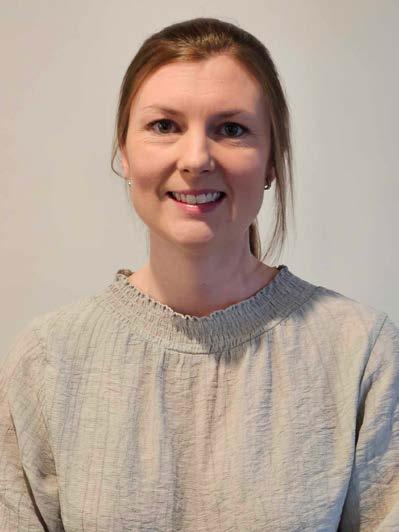
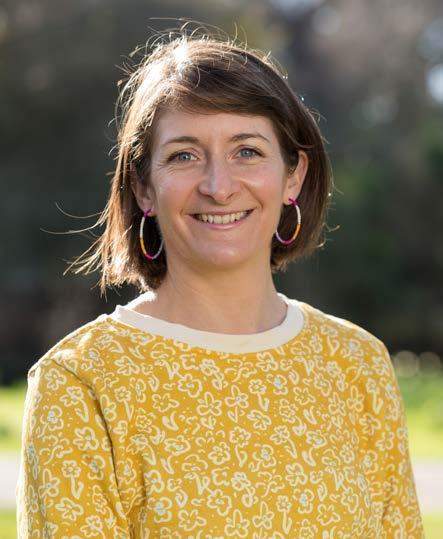
More than 20,000 New Zealanders have IBD, with up to a quarter diagnosed as children or adolescents.
“Typically, when a child presents to their doctor with signs and symptoms of inflammatory bowel disease they’re put through a barrage of tests, including blood and faecal tests, but the ones that are currently available don’t always give clinicians a full understanding of what’s going on,” she says. Colonoscopies are often used to paint a clearer picture, but there could be a less invasive solution. Through her two-year project she’ll assess the suitability of a new blood test that measures the level of myeloperoxidase, an enzyme produced by immune cells, to detect the amount of inflammation happening inside the body.
“If we had a blood test that could accurately reflect disease severity in children with inflammatory bowel disease, we could reduce the number of colonoscopies they require and enable earlier diagnosis and more effective disease monitoring. This ultimately means these children can spend more time out of the hospital and enjoying their childhoods,” Teagan says.
Research Associate Professor and Registered Clinical Psychologist at the University of Otago, Christchurch, Katie Douglas, will receive $101,777 to support her two-year research project investigating a new psychological treatment for bipolar disorder. Called Behavioural Activation Therapy, the treatment is commonly used to help people experiencing depression, but new research overseas suggests it could be just as effective at treating bipolar disorder.
The condition affects nearly 2 per cent of all Kiwis, but rates are double for Māori, says Katie.

“Unfortunately, most people with bipolar disorder cannot access psychological therapy in Canterbury, or throughout New Zealand. Medication can help, but having a qualified therapist to support patients is critical for long-term recovery.”
Getting access to specialist mental health services can be challenging, and those who are accepted for treatment usually don’t get the help they need long-term.
“It’s really disheartening because what we know about bipolar disorder is that it’s a lifelong condition. It’s chronic and it’s relapsing so there does need to be long-term psychological input for these people, so they know how to manage their condition,” she says.
Twenty people with bipolar disorder will be recruited to take part in the project. They'll receive therapy over a period of six months, with assessments carried out before and after to determine the trial’s success. The therapy will be adapted to incorporate Māori models of health.
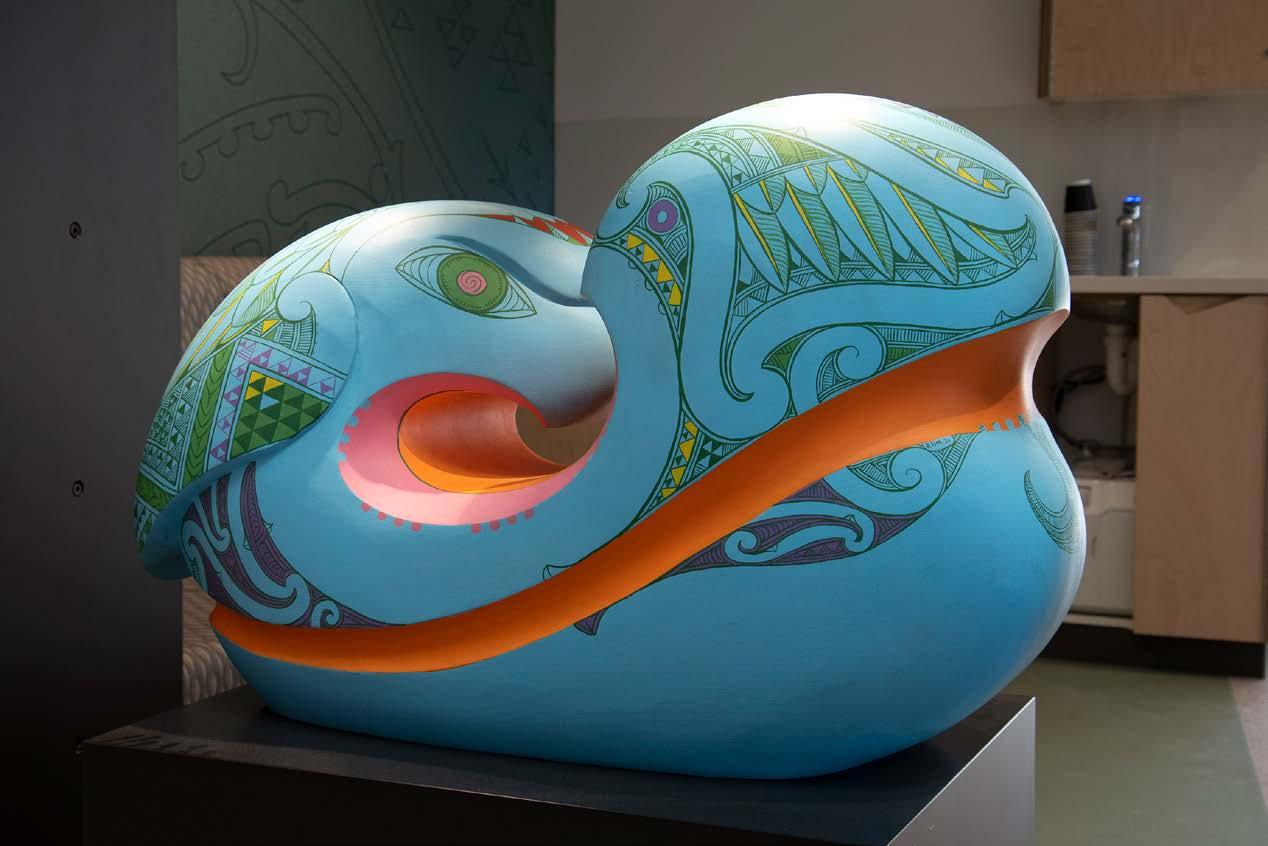

“Ensuring the treatment is culturally responsive is key, especially given rate of Māori affected by bipolar disorder is disproportionally higher than the rest of the community,” says Katie.
Canterbury Medical Research Foundation Chief Executive Melissa Haberfield says the calibre of this year’s Major Project Grant applicants was extremely high, and the research projects that have been submitted are testament to the exceptional talent of Canterbury researchers.
“Canterbury is home to some of the world’s most innovative and highly recognised health and medical researchers. We celebrate six incredible women who are leading research projects that we anticipate will create better health and wellbeing outcomes for the people of Canterbury and the world.”
Other recipients of the Canterbury Medical Research Foundation’s Major Projects Grants are:
» Senior Lecturer, University of Canterbury, Vanessa Morris, granted $110,000 for research into how tear drops can aid in an early diagnosis of Parkinson’s Disease.
» Research Fellow at the University of Otago, Christchurch, Louise Paton, granted $109,843 to research the link between what we eat, how our body metabolises energy and heart disease.
» Senior Research Fellow at the University of Canterbury, N. Amy Yewdall, granted $110,000 to investigate the biomolecular interactions leading to disease progression in acute myeloid leukaemia.
» Senior Lecturer at the University of Otago, Christchurch, Katherine Donovan, granted $109,985 to investigate whether an integrated group treatment could support wellbeing in adolescents impacted by the March 15 attacks.
Over the past 63 years the Canterbury Medical Research Foundation has funded more than $33 million in research into some of the world’s most devastating conditions such as: cancer, cystic fibrosis, heart disease, brain disease, bowel disease, stroke and multiple sclerosis, to name a few.
In order to continue to provide a meaningful level of research funding, the Foundation is reliant on the goodwill and financial support of generous individuals, trusts and businesses from around our region and beyond.
Saturday 9 September is International Fetal Alcohol Spectrum Disorder (FASD) Day, marked on the ninth day of the ninth month to symbolise the nine months of pregnancy.
FASD is the name given to a collection of disorders that can occur in a person who has been exposed to alcohol in the womb. These effects can include physical ailments and problems with behaviour and learning. Often, a person with FASD has a combination of these issues.
FASD can be difficult to diagnose with many symptoms not obvious until a child starts preschool or primary school, and they are required to concentrate, learn, follow the rules, and fit in with others.
It is important to consider having your child assessed for FASD if:
› There is a known history of prenatal alcohol exposure during the pregnancy
› There are concerns for your child’s learning, behaviour, social or emotional functioning. Research has consistently found the brain to be the organ most sensitive to the effects of prenatal exposure to alcohol, as the brain is developing throughout the entire pregnancy. Around eight babies a day (3000 per year) are born with FASD in New Zealand.
Overall, New Zealanders are drinking less alcohol, however it is still our most widely consumed recreational drug, and a prominent feature of our social lives. New Zealand’s drinking culture and unplanned pregnancy rate are crucial barriers to FASD being prevented.
The essential knowledge is that no amount of alcohol is safe for an unborn child, and friends and whānau of hapū māmā should encourage and support them to not drink during pregnancy.

If you’re interested in learning more, you can attend an online seminar hosted by Te Mana OraUnderstanding FASD: Creating supports through connections.
This online hui will cover:
› Introduction to Fetal Alcohol Spectrum Disorder (FASD)
› How to create support through connections.
As well as being informative, it will be solution focused. The hui will reflect Canada FASD Research Network’s 2023 theme: Uniting our strengths: Finding solutions together.
Date: Thursday 7 September
Time: 12.30 - 1.30pm
Location: Online via Zoom
Register online (you will receive an Outlook invitation once you have registered).
Learn more about FASD through the Fetal Alcohol Spectrum Disorder Care Action Network: https:// www.fasd-can.org.nz/


Step Ahead is holding its annual art exhibition from 18 to 28 September at the Phillipstown Hub, 39 Nursery Road, in room 10A.
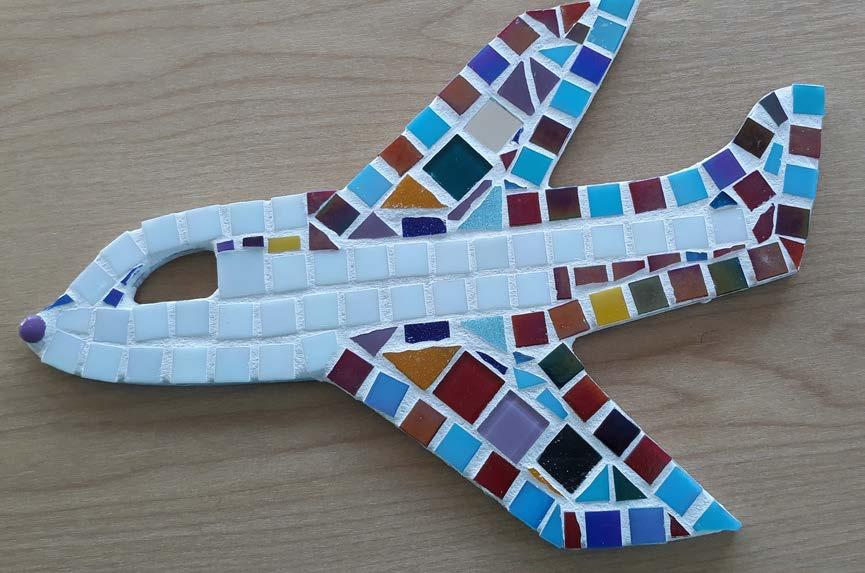
Step Ahead is a Canterbury-based not-for-profit charitable trust providing social, physical, creative and education activities and technology support for adults with a mental health condition.
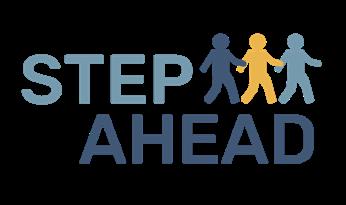
The exhibition coincides with Mental Health Awareness Week and provides a goal for people to work towards and an opportunity to recognise and celebrate their skill and achievement.
This year, 33 artists are exhibiting. Their work may include drawings, paintings, photography, mosaics, stone carving and other crafts.
Items for sale can be purchased at the exhibition opening from Monday 18 September at 2.30pm.
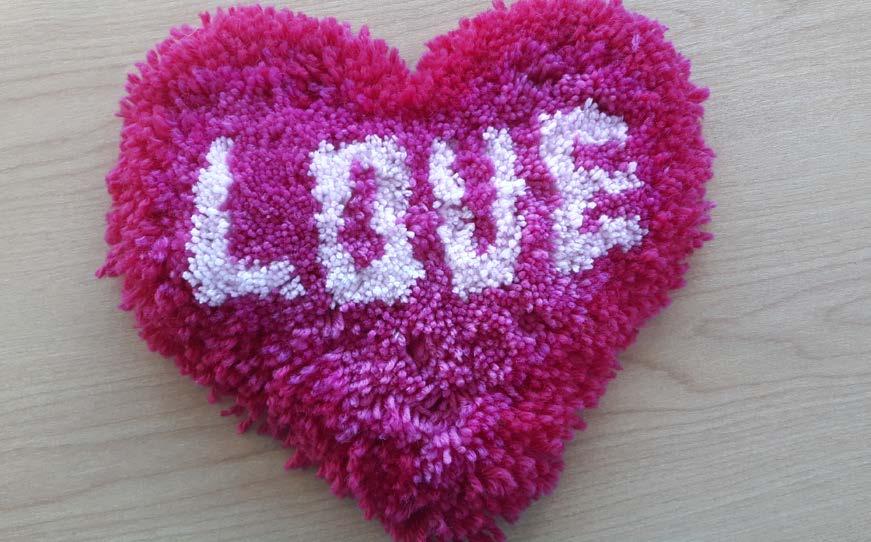
Contact Step Ahead on (03) 389 4001, 0800 688 732 or info@stepahead.org.nz for more information about sales and when the exhibition is available for viewing, after the opening.

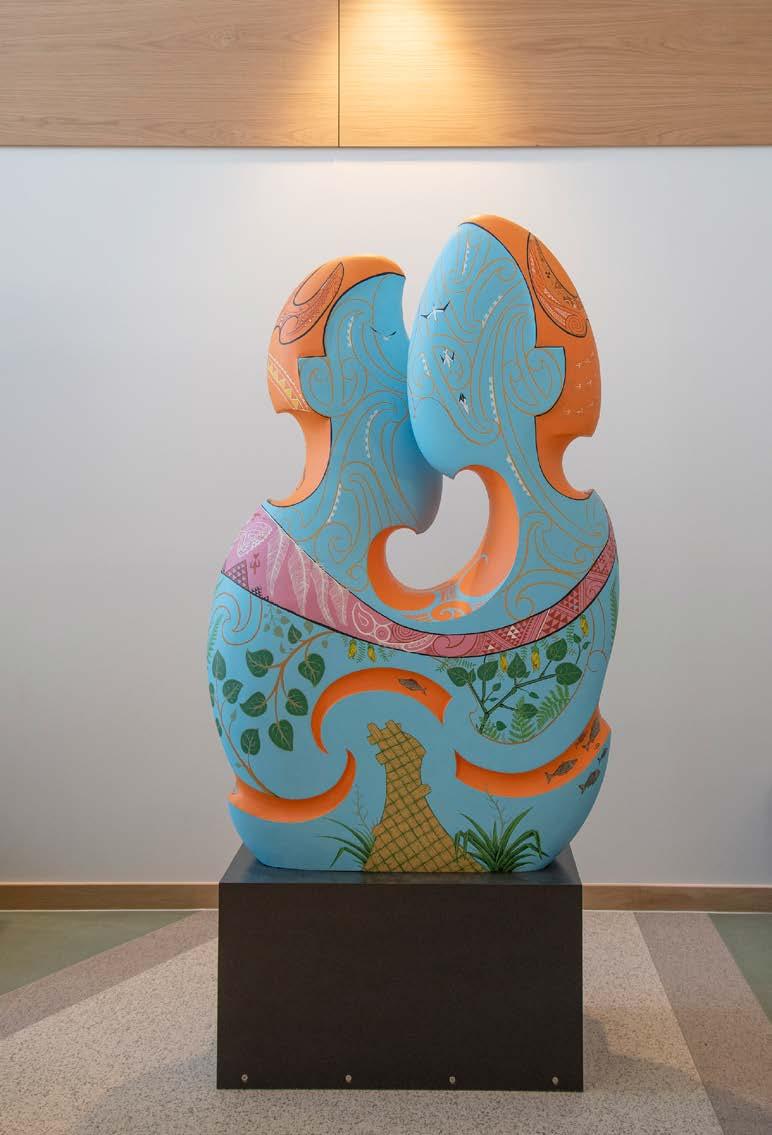
Today is World Sexual Health Day (WSHD) and the theme for this year is consent. Consent is a crucial element of any healthy sexual encounter, and it’s important to know what it means, how to express it, and how to obtain it. Respecting and valuing everyone’s autonomy and choices in sexual matters, regardless of gender, sexual orientation, or any other factor is essential.
A way to remember the different parts of consent is the acronym, FRIES.
Freely and Willingly: It isn’t consent if there is pressure, manipulation, or influence of drugs or alcohol.
Reversible: You can change your mind about sex at any time and remove consent. Even if it is your long-term partner, even if you already agreed, even if you’ve done it before, or even if you’re in the middle of sex.

Informed: You can only consent to something if you have the full story. For example, if someone says they’ll use a condom and then they don’t, there isn’t full consent.
Enthusiastic: Sex is about doing things that you want to do, not things you have to do! Enthusiastic can mean the difference between an ‘okay’ or ‘I guess’ vs a ‘absolutely’ or ‘hell yes!’
Specific: You must be specific about what you’re asking consent for. For example, saying yes to kissing does not mean someone has consented to penetrative sex. Agreeing to hang out at someone’s apartment doesn’t mean agreeing to sex— even if it’s 3am.
A Lifetime of Consent. Whether they’re one or 101, all people deserve bodily autonomy. Start talking about consent with young children and always keep it in mind. Consent is important at any age.
Together, we can raise awareness, reduce stigma, and improve access to essential sexual health resources. Let’s work towards a healthier, happier world with sexual health, rights, and justice for all. There is more information and a quiz to test your knowledge of consent on the WSHD website here.
Dementia Canterbury’s unique holistic programme for people with younger-onset dementia is proving successful at reducing anxiety and stress for local whānau.

The people-centred initiative matches people with younger-onset dementia with a key worker from the moment of diagnosis, allowing early intervention, guided by the latest research and developments in the field.
Dementia Canterbury Younger Onset Key Worker, Erica Collingwood says the programme aims to empower clients to continue to be themselves, be connected and be fulfilled, whilst engaging in evidence-based activities.
“The opportunity for key workers to offer support and connection from the point of diagnosis at the Cognitive Disorders Clinic with Neurologist Campbell Le Heron is unique. We then follow this through to supporting engagement with our Younger Onset Programme, which we have finetuned to meet the specific needs of people with younger-onset, and their whānau,” she says.
Younger-onset dementia occurs before the age of 65 and has a significant impact on those diagnosed. Traditional models of post-diagnostic support are set up to focus on the needs of older adults, leaving the needs of those with youngeronset dementia unfulfilled.
After noticing more people being diagnosed with younger-onset, Dementia Canterbury’s Chief Executive Darral Campbell started to develop the younger-onset specific programme, which has been refined based on research over the past five years.
“We initially started with a weekly programme for people with younger-onset where they came to us and engaged in a series of connection activities. That programme was hugely successful, and people reiterated the importance of fun, being connected to other people, and engaging in meaningful activities.
So, the programme is very much about enabling people to continue to do the things that are meaningful for them, but including purposeful cognitive stimulation and physical activities too,” Campbell says.
Dementia Canterbury believes every person and their whānau, regardless of their age, is entitled to support that meets all their needs and have created a people-centred initiative that engages their younger-onset clients from the moment of diagnosis. The holistic approach to this programme sees the Dementia Canterbury team walking alongside people with Younger-Onset Dementia and their whānau, providing specialist information and education, connection and socialisation, cognitive stimulation, and physical activity.
The best measure of success for Dementia Canterbury is the satisfaction and voices of the people living with Younger-Onset Dementia and their whānau.
One client, Lois says:
“Sometimes, it’s the only place we feel normal, as everyone understands.”
Lois was diagnosed with younger-onset Alzheimer’s disease in February 2021 and her daughter Sarah says the difference Dementia Canterbury’s support has made for her mum and the family has been huge.
“The team stood beside mum and our family, and gave us information, tools and reassurance that enabled us to feel more confident and relaxed with the path ahead of us”she says.
Dementia Canterbury exists to support people and their whānau to continue to live fulfilling lives following a Mate Wareware-Dementia diagnosis. Their team provides free, community-based education, activities and specialised support services across the Waitaha-Canterbury and Te Tai Poutini-West Coast regions.

Something for You is the Te Whatu Ora - Waitaha Canterbury employee benefits programme. The deals offered are from the New Zealand business community to say thank you for all that you do. Please see below offers for you.
Loula Hire – www.loulahire.co.nz
Offers high quality, modern and timeless furniture to suit any celebration throughout the South Island and are offering 10 percent off furniture hire for Te Whatu Ora Waitaha staff. Show your staff ID to redeem.
Torpedo7-Tower Junction, Northlink and throughout NZ
Would like to offer a year-round offer for our staff (up to 40 percent off). Show this flyer in-store printed out or on your device. Torpedo7 Flyer
Black Cat Cruises - Akaroa Main Wharf, Akaroa Get 50 percent off the Akaroa Harbour Nature Cruise. Mote you must pre-book as the cruises are running at reduced capacity. Use code CDHB50 when booking online (limit two people) and ensure you take your staff ID with you on the day.

Sculpt Reformer Pilates - 62 Mandeville Street, Riccarton
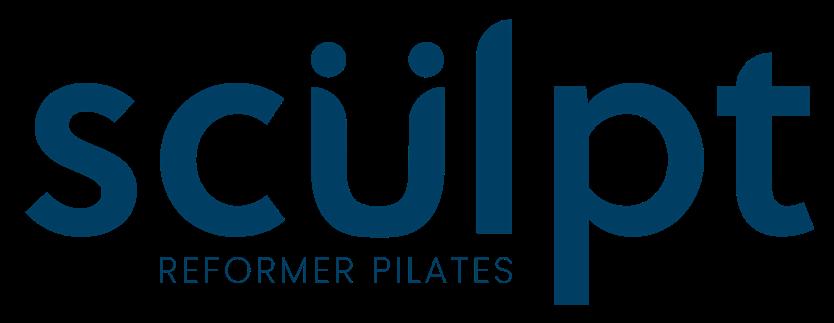
Intro deal: Try five classes for $45. Valid for 14 days from the first booking, new clients only. Contact info@sculptreformerpilates.co.nz to book.
1. b. Fiji (Fiji beat England 30 – 22)
2. d. Steve Hansen
3. a. Italy
4. c. Sam Whitelock (146 caps)
5. b. USA


7. a. Runner-up pool B
8. d. Sam Cane
9. b. False. France is solo host for the first time but has co-hosted three times before (1991, 1999 and 2007)
10. b. Nine (Will Jordan, Leicester Fainga’anuku, David Havili, Richie Mo’unga, Sam Whitelock, Scott Barrett, Tamaiti Williams, Fletcher Newell and Codie Taylor)


